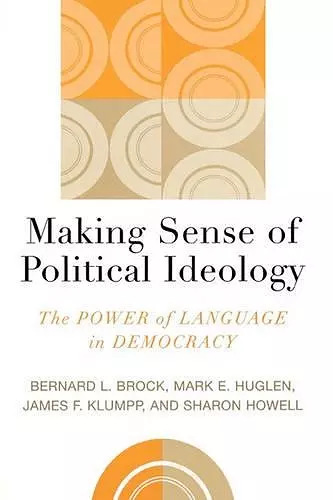Making Sense of Political Ideology
The Power of Language in Democracy
Mark E Huglen author Bernard L Brock author James F Klumpp author Sharon Howell author
Format:Paperback
Publisher:Rowman & Littlefield
Published:1st Oct '05
Currently unavailable, our supplier has not provided us a restock date

Making Sense of Political Ideology explores the erosion of ties among ideology, language, and political action. Analyzing political language strategies, it shows how to dissect language so we can better understand a speaker's ideology. The authors define four political positions-radical, liberal, conservative, reactionary-and apply their techniques to contemporary issues such as the war on terrorism. They emphasize the dangers of staying trapped in political gridlock with no consensus for governmental direction and propose that the ability to identify and bridge positions can help political communicators toward constructing coalitions and building support for political action.
With Bell's The End of Ideology in 1960, the rise of image politics, and the growing recognition of the independent voter, for almost fifty years ideology seemed to become an exhausted concept. Making Sense of Political Ideology reinvigorates the concept, suggesting that ideology can be used in and explain a host of interactions and transactions in politics. -- James W. Chesebro, Ball State University In this timely book, Huglen, Brock, Klumpp, and Howell insightfully analyze a central problem in the American democratic process. While such terms as 'liberal' and 'conservative' figure importantly in the national debate, nobody knows what they mean any longer. In the current climate of ideological incoherence, terminological unpredictability, and loss of historical context, it is small wonder that most Americans attend only superficially to political discourse, especially new voters. In a sense they are right, for our political vocabulary has itself become superficial. -- Herbert W. Simons, Temple University, author of Persuasion in Society, editor of The Rhetorical Turn The authors provide an insightful critical examination of contemporary political discourse, one that invites a fresh and optimistic view of the transformations in political language necessary to transcend seemingly incompatible values, goals, and visions and renew the civic traditions on which our nation was founded. -- Dale A. Bertelsen, Bloomsburg University Making Sense of Political Ideology would be a useful addition to libraries for undergraduate use. The style is accessible and the authors are strong on description and analysis. Political Studies Review The authors' contribution to understanding the widespread dissatisfaction with contemporary political discourse is original and provocative. They argue that four familiar political positions are associated with four distinct Burkean rhetorical emphases, different kinds of change, and different kinds of catharsis. This book should be widely read by students of rhetoric and politics at a time when both major political parties search for their identities in the post-Bush era. -- Craig Allen Smith, North Carolina State University
ISBN: 9780742536715
Dimensions: 228mm x 176mm x 12mm
Weight: 249g
160 pages